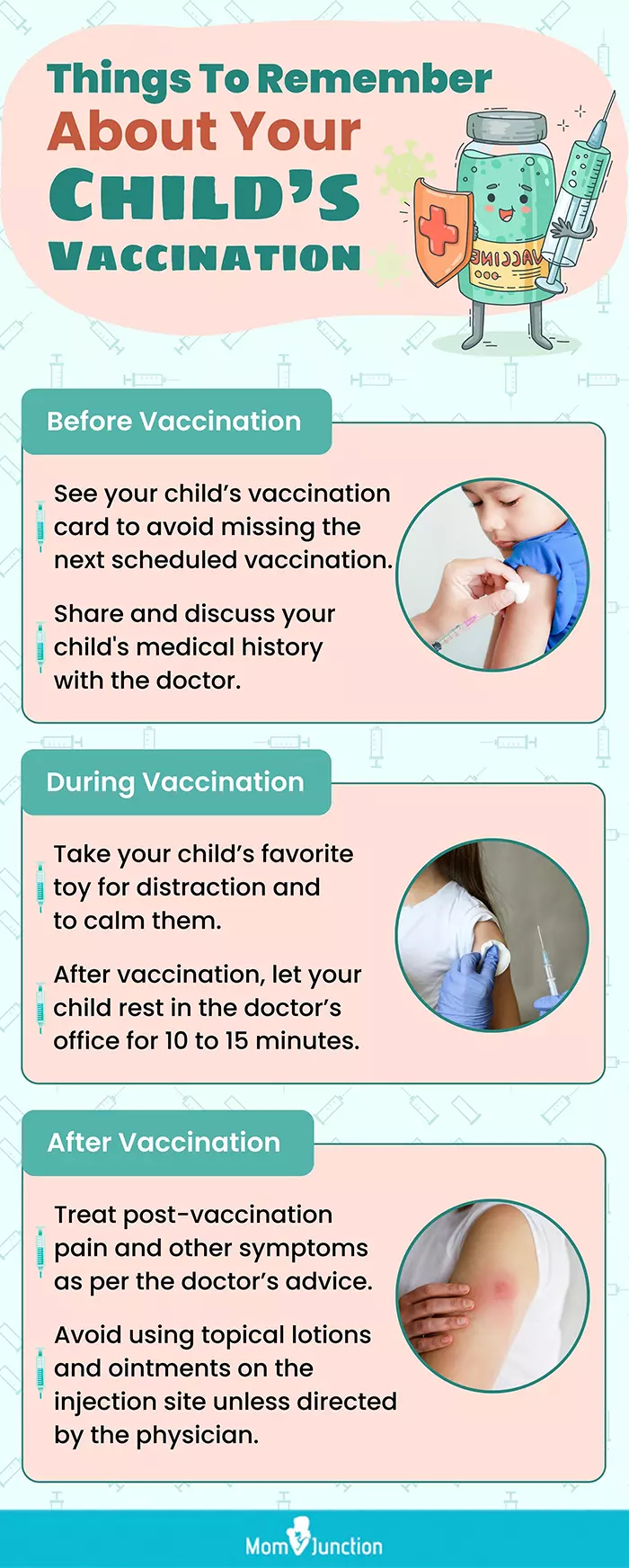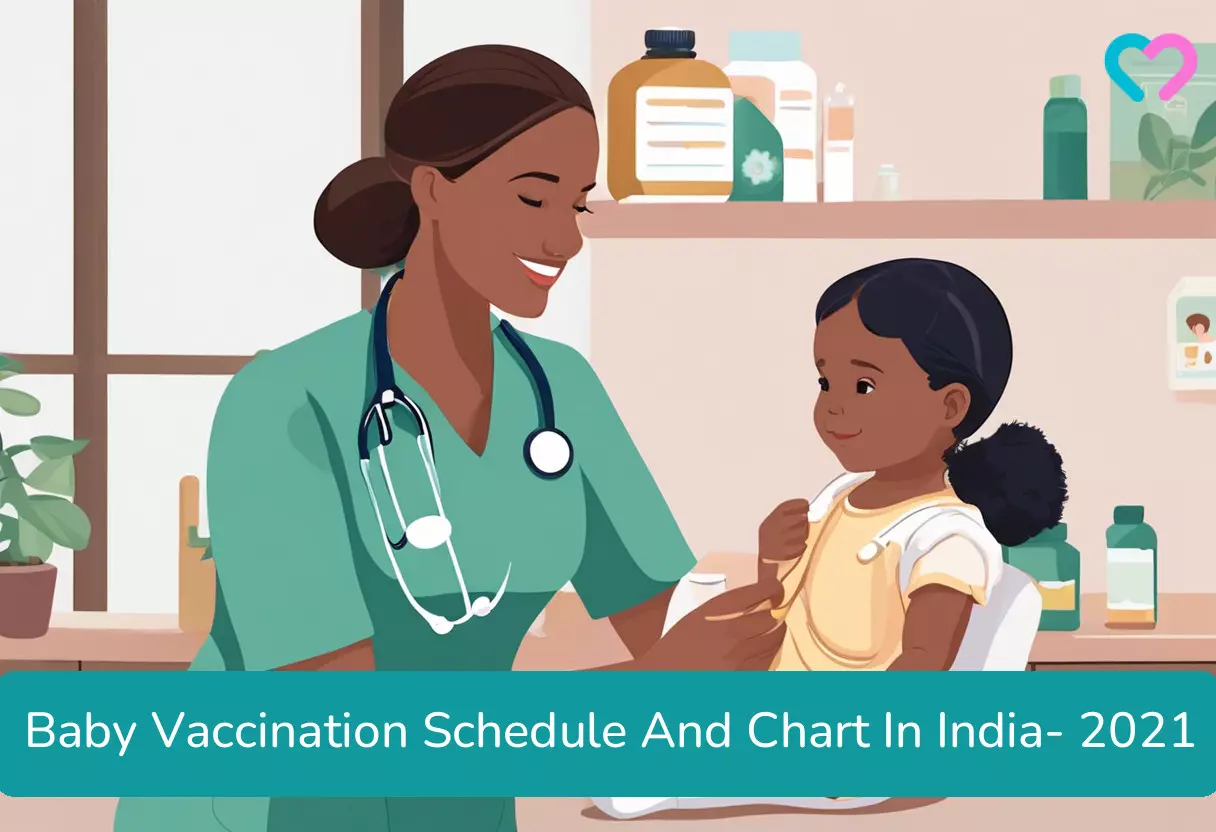
Image: Shutterstock
Vaccination for babies is the most effective strategy to protect or immunize your child from various infectious diseases. When compared to the expense of illness treatment, vaccination is also cost-effective. Vaccines develop herd immunity and prevent many life-threatening diseases, with lasting complications, such as polio (1).
Antigens or parts of antigens that cause disease are contained in vaccines. Since the antigens in the vaccination are weakened or killed in the laboratories before employing in vaccines, they do not cause disease. They are, however, powerful enough to stimulate the immune system to create antibodies against the antigen in question. Therefore, it implies that your child develops immunity without becoming ill (2).
Read on to learn more about the immunization schedule and vaccination chart for babies in India. the reasons for vaccination, and the repercussions of not getting vaccinated.
Key Pointers
- Vaccination is the most effective and economical method of protecting a child from infectious illnesses.
- The Indian Academy of Pediatrics and Advisory Committee on Vaccines and Vaccination Practices regularly evaluate and update the country’s immunization schedule for infants and children.
- The Indian Academy of Pediatrics advises receiving a booster dose of the injectable polio vaccine in children between four to six.
- An annual flu vaccination is vital in protecting children from flu-related complications.
- The benefits of vaccination include safeguarding the infant’s health, lowering the risk of disease in public, and administering safe vaccinations.
Vaccination Schedule For Babies and Children In India
Advisory Committee on Vaccines and Immunization Practices (ACVIP) of the Indian Academy of Pediatrics (IAP) is responsible for vaccine recommendations, vaccination coverage, reviews and updates on the immunization schedule for babies and children (0-18 years) in India. All the licensed vaccine types are included in the vaccination schedule based on clinical evidence and government vaccination programs and policies of the National Immunization Schedule. Vaccine scheduling app shows vaccination schedules and vaccines recommended by the Advisory Committee on Immunization Practices.
Complete or full immunization” coverage is defined as a child that has received one dose of BCG, three doses of pentavalent, pneumococcal conjugate (PCV), oral polio vaccines (OPV); two doses of Rotavirus and one dose of measles vaccine.
Several children in India are under-vaccinated due to various reasons. The graph below depicts the percentage of one-year-old children immunized for various diseases or pathogens in India. All doses, including boosters, are counted individually. The coverage is steadily increasing, indicating that India is making significant progress.

Immunization coverage of one-year-old babies in India
Source: Global vaccine coverage; WHO/UNICEF Did you know?
Did you know?The vaccines at each age may include the following (3).

# These vaccines are given for babies and children with a high risk of developing the disease or those who live in endemic areas. The time frame may vary for these, depending on other factors. You may seek advice from the pediatrician for individualized recommendations.
These can be given as single vaccines and as combination vaccines. Pediatricians may also recommend painless vaccinations for babies. For instance, a pediatrician may recommend acellular pertussis vaccines that may have less pain and injection site reactions than whole-cell pertussis vaccines.
The annual influenza vaccine, which is given annually, can protect your child from the flu and its complications. Children who receive yearly flu shots may have fewer complications of flu even if they get the flu.
In case you miss a scheduled vaccine, contact your pediatrician to know the catch-up period and vaccinate within this time frame.
 Did you know?
Did you know?Other Vaccines
The rabies vaccine is not an intended part of the vaccination schedule.
It is given after animal bites or scratches, referred to as post-exposure prophylaxis (PEP). Both domestic and wild animal bites should be addressed with proper wound care and rabies vaccination. According to the World Health Organization (WHO) data, more than 29 million people worldwide receive post-exposure prophylaxis (PEP) for rabies every year.
The (WHO) reports that in up to 99% of cases, domestic dogs are responsible for rabies virus transmission to humans. Therefore, experts suggest preexposure prophylaxis (PrEP) for high-risk children, including children with domestic pets and those vulnerable to animal bites.
Four doses of rabies vaccine are recommended, and rabies monoclonal antibody is recommended instead of rabies immunoglobulin in children who have category III animal bite (4). Single or multiple skin wounds and scratches, contamination with saliva by animal licking wounds and mucous membranes, or severe exposure, like direct contact with bats, have been included in category III bites.
Why Do Babies Need Vaccination?
Immunization protects your baby from many severe diseases. When you choose to vaccinate your baby, you are also protecting the health of the family and communities. Complete immunization is encouraged everywhere globally, as it is the best way to protect them from common diseases in children.
The top reasons for immunization can be (5):
- Immunization can save lives: The availability of safe and effective vaccines has helped humankind conquer several deadly diseases, such as polio, smallpox, etc. Polio was one of the most-feared diseases since it led to paralysis and even death. Vaccination is the only way to prevent polio since there is no cure (6). Thanks to the vaccination, countless children have been saved, and the disease is now only found in a few countries in the world.
Vaccines are safe and effective: Vaccines are made available after years of clinical studies on safety and effectiveness. Although vaccines may cause side effects such as pain, redness, and swelling at injection sites, their benefits are more significant than their adverse effects. Currently, painless vaccines are also available for some diseases.
- Vaccination protects family and communities: When you vaccinate your baby, you are also reducing the risk of the disease among those who cannot receive the vaccination. Pregnant women, people with vaccine allergies, and people with cancer, like leukemia, may not be able to receive a vaccination. But they have less risk of vaccine-preventable infection when other healthy people in the family are fully vaccinated.
- Saves your time and money: Vaccination for a disease may take less time and money than hospitalization and treatment for the disease. Many countries have federally funded vaccination programs for children from low-income families (7). You may ask your pediatrician about free vaccination for children (VFC) in your country.
- Protect future generations: Vaccination has helped eliminate many diseases worldwide, such as smallpox. Effective immunization can help eradicate diseases, thus protecting future generations.
Although medical treatments are available for some vaccine-preventable diseases, you may consider vaccinating your baby to avoid morbidities and mortality. Prevention is always better than cure.
Apprehension Of Using Vaccines
Although vaccines are the best way of disease prevention, some people choose not to vaccinate their children due to certain misbeliefs. The anti-vax movement has led to confusion about vaccination safety and vaccination hesitancy among parents to immunize their babies. Such movements, which often spread through social media, have led to the outbreak of certain diseases, such as diphtheria, measles, etc., in some countries in recent years, indicating the potential harm caused by an anti-vaccine stance.
Injection vaccines may cause mild side effects or vaccine injuries and pain. However, these reasons do not outweigh the benefits of vaccination, and often the disease may have fatal outcomes (7). According to the CDC, the mild vaccination side effects go away in a few days without any intervention (2). Vaccination is thus a better choice than contracting the disease.
General Contraindication and Precaution for all Vaccines
Vaccination in babies should not be avoided in the following circumstances
- Anaphylactic reaction to a vaccine or a vaccine constituent contraindicates further dose of that vaccine or vaccines containing that substance.
- Moderate to severe illnesses with or without fever.
- Anaphylactic latex allergy.
Points To Remember During Vaccination
It is important to vaccinate your child as per schedule. You can set vaccination reminders to prevent missing of vaccines. It is helpful if you pay attention to the below-listed parenting tips during your kid’s vaccination.
- Consider asking your child’s doctor regarding the benefits and side effects of the vaccine. Clear all your doubts before vaccination.
- Inform your doctor if your baby has a fever, cold, previous allergic reactions, seizures, and egg allergy.
- You may share your child’s medical history and discuss it with the doctor if any conditions are concerning.
- You may take the favorite toy for babies; this may help them calm down after vaccination.
- Explain the use of vaccines to older children and tell them all children get the shot.
- It is preferable to stay in a doctor’s office for 10 to 15 minutes after vaccination since they can immediately act on any acute post-vaccination reactions.
- Babies may need a little rest after vaccination, thus plan accordingly.
- You may follow the healthcare provider’s advice to manage post-vaccination pain and other symptoms.
- Do not apply topical creams and ointments on the injection site unless prescribed.
- Mild fever in the post-vaccination period can be normal. However, high fever or convulsions require immediate medical care. Severe and long-lasting side effects of vaccines are extremely rare.
Check your baby’s vaccination records to find out the next vaccination date. Always take the vaccination card along while visiting the doctor and ensure that the vaccination details are enrolled correctly in the immunization record for future reference. Your child’s pediatrician may also assess the baby development and health during vaccination or pediatrician visits.
It is important to use approved vaccines and administer immunizations from licensed professionals. Using unapproved vaccines from illegal sources may pose a risk of adverse reactions and are often associated with fatalities. Appropriate immunization during childhood can provide long-term benefits to the child and also help communities at large.
Infographic: Vital Points About Children’s Vaccination
As per the immunization schedule, every child should be given vaccine shots for various infections and diseases at their specific age. The infographic below lists some notable pointers that every parent should remember when it is time for their child’s vaccination. Illustration: Momjunction Design Team
Frequently Asked Questions
What happens if my baby’s vaccination is delayed?
Delaying vaccines makes your baby susceptible to various preventable diseases (9).
How long will vaccines affect babies?
Usually, local reactions such as swelling, redness, and pain may start within 24 hours of the shot and often last three to five days. For DTaP vaccine, they can last up to seven days. Fever with most vaccines may occur within 24 hours and last one to two days (10).
Do babies sleep more after vaccination?
Babies may either appear irritable and unsettled or sleepy after vaccinations. However, a study suggests that infants may sleep more in the first 24 hours after immunization, especially if they have received the vaccine in the afternoon or have developed a fever (10) (12).
How do I prepare my baby for shots?
You may breastfeed your baby to calm them before shots. You may carry their favorite toys or books and try to distract them when receiving shots. Also, ask the doctor to give your child a topical ointment, pain-relieving spray, or a sweet solution of sucrose or glucose a minute or before the shot to help reduce pain (14).
Illustration: Baby Vaccination Schedule And Chart In India- 2021

Image: Stable Diffusion/MomJunction Design Team
References:
- Importance of Immunizations; Michigan medicine: The University of Michigan
https://www.uofmhealth.org/health-library/hw255342#:~:text=Vaccines%20are%20the%20best%20way,serious%20complications%20and%20even%20death. - Reasons to Vaccinate; The Centers for Disease Control and Prevention
https://www.cdc.gov/vaccines-children/reasons/?CDC_AAref_Val=https://www.cdc.gov/vaccines/parents/why-vaccinate/vaccine-decision.html - S Balasubramanian, et al.; Indian Academy of Pediatrics (IAP) Advisory Committee on Vaccines and Immunization Practices (ACVIP) Recommended Immunization Schedule (2018-19) and Update on Immunization for Children Aged 0 Through 18 Years; Indian Academy of Pediatrics (IAP)
https://www.indianpediatrics.net/dec2018/1066.pdf - Rabies; The World Health Organization
https://www.who.int/news-room/fact-sheets/detail/rabies - Five Important Reasons to Vaccinate Your Child; The U.S. Department of Health & Human Services
https://www.vaccines.gov/en/ - Does polio still exist? Is it curable?; The World Health Organization
https://www.who.int/news-room/questions-and-answers/item/does-polio-still-exist-is-it-curable - Vaccines for Children (VFC) Program; The Centers for Disease Control and Prevention
https://www.cdc.gov/vitalsigns/vaccines-for-children/index.html#:~:text=The%20VFC%20program%20was%20established,protected%20from%20life%2Dthreatening%20diseases.” rel=”follow noopener noreferrer - Olivia Benecke and Sarah Elizabeth DeYoung; Anti-Vaccine Decision-Making and Measles Resurgence in the United States; Global Pediatric Health
https://www.ncbi.nlm.nih.gov/pmc/articles/PMC6657116/ - Tarun Shankar Choudhary et al.; Delayed vaccination and its predictors among children under 2 years in India: Insights from the national family health survey–4; NCBI (201
https://www.ncbi.nlm.nih.gov/pmc/articles/PMC6996155/ - Immunization Reactions; Seattle Children’s
https://www.seattlechildrens.org/conditions/a-z/immunization-reactions/ - Immunisation – side effects; Better Health Channel
https://www.betterhealth.vic.gov.au/health/healthyliving/immunisation-side-effects - Linda Franck et al.; Infant Sleep After Immunization: Randomized Controlled Trial of Prophylactic Acetaminophen; NCBI (2011)
https://www.ncbi.nlm.nih.gov/pmc/articles/PMC3387894/# - IAP Immunization Schedule 2021: Key updates & major changes.
https://acvip.org/professional/columns/key-changes-in-iap-immunization-schedule-2021 - Make Shots Less Stressful; Centers for Disease Control and Prevention
https://www.cdc.gov/vaccines-children/before-during-after-shots/less-stress.html?
Community Experiences
Join the conversation and become a part of our nurturing community! Share your stories, experiences, and insights to connect with fellow parents.
Read full bio of Dr. Atiqur Rahman Khan
Read full bio of Dr Bisny T. Joseph
Read full bio of Rohit Garoo
Read full bio of Shinta Liz Sunny


















